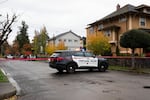Portland Mayor Ted Wheeler has decided to move forward with a controversial technology that claims to detect and pinpoint gunshots throughout the city.
The Focused Intervention Team’s Community Oversight Group, or FITCOG, recommended the city adopt ShotSpotter in a July report. That report called the technology “a focused deterrence tool as part of the overarching gun violence response strategy” in the city.
In Thursday evening’s FITCOG meeting, Stephanie Howard, Wheeler’s director of community safety, said the decision to advance a pilot program with the technology was made that afternoon after Wheeler met with Police Chief Chuck Lovell to discuss the idea.

Portland police officers investigate a shooting on Oct. 26, 2021 in North Portland.
Jonathan Levinson / OPB
“Chief Lovell recommended exploring implementing ShotSpotter on a pilot basis and the Mayor agrees with that recommendation,” Howard said. “We’ll be working with council offices and making outreach to the community to determine the details of what that pilot might look like.”
ShotSpotter claims it can identify and locate gunshots in real-time using a series of small microphones placed throughout a neighborhood. That information can then be fed to the police. The company claims its technology can differentiate gunfire from other loud noises like a car backfiring or fireworks.
The technology is controversial and a number of recent studies have called its reliability into question.
Vice News and Associated Press stories last year found ShotSpotter analysts modified alerts to help police in Chicago and New York mold evidence to better fit police narratives. In some cases, ShotSpotter audio was the sole piece of evidence used to arrest and incarcerate someone. ShotSpotter filed a lawsuit alleging the stories contained false and defamatory statements.
A study by the MacArthur Justice Center found that “more than 90% of ShotSpotter alerts lead police to find no evidence to corroborate gunfire when police arrive at the location ShotSpotter sent them.” The Chicago Office of the Inspector General found that ShotSpotter led to a dramatic increase in stop and frisks.
And in California, prosecutors used audio conversations recorded using ShotSpotter microphones as evidence in criminal trials.
In an emailed statement, ShotSpotter Senior Vice President of Marketing & Product Strategy Sam Klepper said criticism that ShotSpotter made neighborhoods less safe was baseless and questioned the MacArthur study’s methods.
“ShotSpotter is a proven tool that helps law enforcement respond to gunfire that often goes unreported and saves the lives of gunshot wound victims,” Klepper said.
Klepper also claimed Vice and the AP had retracted their stories. While it is true the outlets changed some of the wording or issued a clarification, the stories still include the underlying claim that ShotSpotter employees have reclassified sounds as gunfire at the request of police.
In making their original recommendation in July, the FITCOG report leaned heavily on a ShotSpotter-funded study refuting the MacArthur study.
Portland’s plan for the technology is the latest in a string of initiatives aimed at addressing a gun violence problem that has spiraled in recent years. On Tuesday, Wheeler announced the bureau was reconstituting its entertainment district detail, a team of officers who patrol Old Town on weekend nights. Portland police have also brought back units of officers focused solely on gun violence, but shootings have remained near record high levels.
As of Wednesday, police had counted 958 shootings this year and 290 people injured by gunfire. There have been 66 homicides, 57 of them involving gunfire.
Howard said the proposal will entail going over the city’s gun violence data to determine the scope and location of the ShotSpotter pilot program before presenting it to the City Council for a vote. Howard said she hopes to have a timeline for the proposal in the next two weeks.
